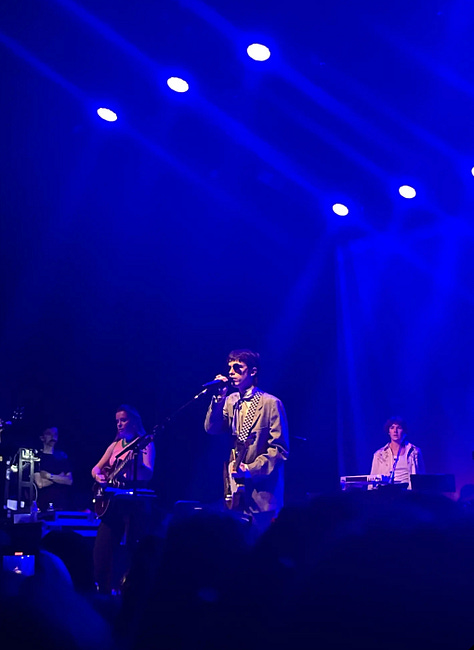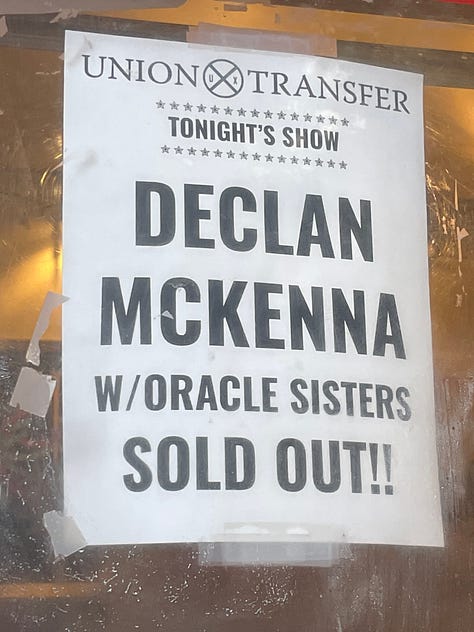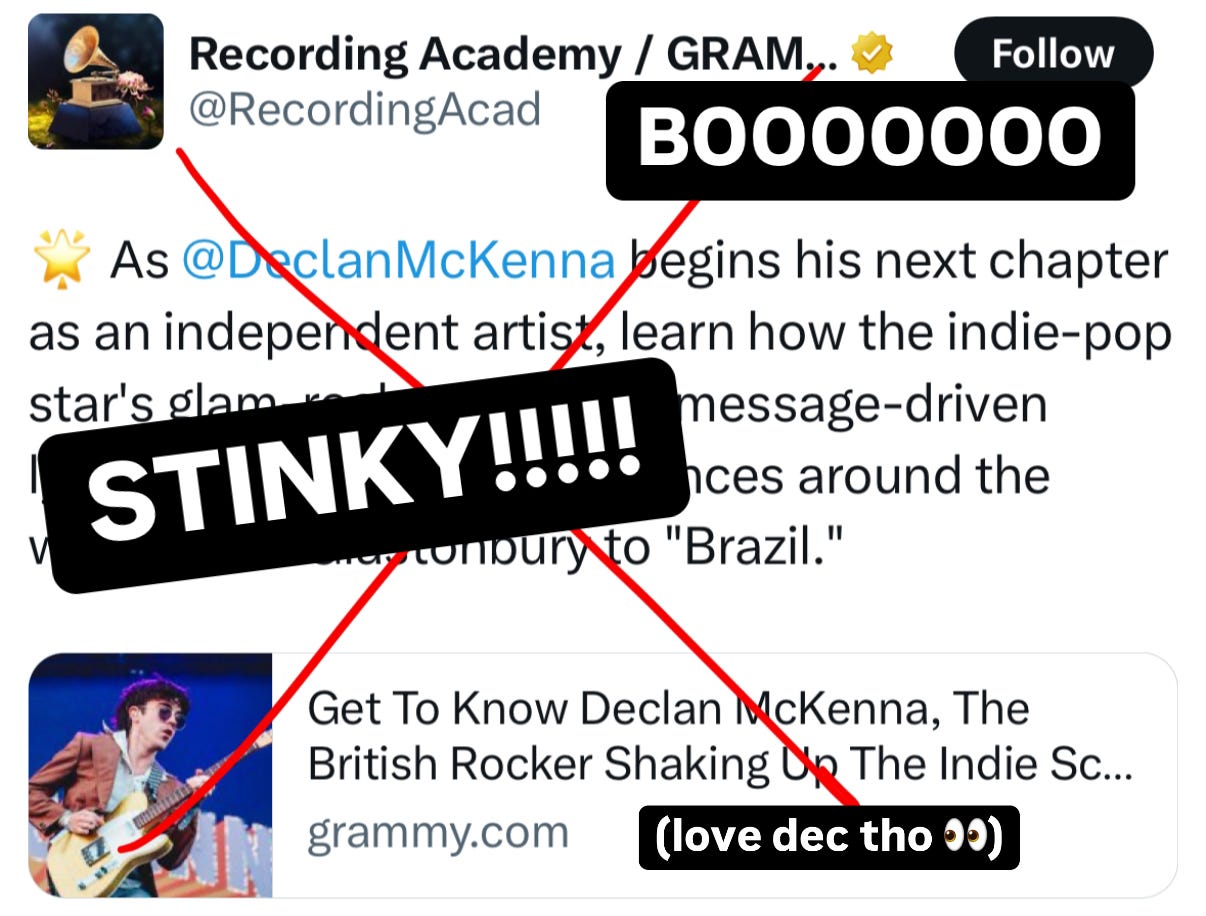What Happened to the Beach? The GRAMMYs News Team Scorched It.
An essay on professionalism in music journalism, why AI sucks, and my favorite indie darling I'm a little cringe about.
Because of the nature of fandom culture—intense feelings about artists, almost perpetual dissatisfaction with critics when they don’t like and/or interpret an album exactly like one does, and (sometimes) a blindness to the actual quality of work one’s favorite produces—it can be difficult to take an online complaint seriously. It’s easy to scoff at a Halsey fan scorning Pitchfork or Anthony Fantano (hi new boss) for not getting the “intimate” meaning behind her most recent album, The Great Impersonator. Many reporters aren’t concerned with the personal life of a pop star when assessing the work as a standalone piece of music. Sometimes, the music isn’t as meaningful or strong as the fan thinks it is (especially The Great Impersonator). Sometimes, an artist is just an okay pop star, not the Next Best Thing on the Planet.
A recent article posted on the GRAMMYs official news blog concerns one of my favorite artists of all time, Declan McKenna. I know that writing a formal retort to a superficial post celebrating a musician’s recent surge in popularity makes me look like a fan that takes their indie darling a little too seriously. After going to two concerts (and planning to attend more), logging an ungodly number of hours streaming his music, owning at least three pieces of official merchandise, writing passionate reviews on What Do You Think About The Car? (2017) and Zeroes (2020) that will never see the light of day, and acquiring a Declan-centric digital footprint that probably dates back to the Liar (2016) EP release, I recognize that I might be one album away from becoming ClubDeclan. Plus, the article is more than favorable. The author apparently admires McKenna’s recent label independence, his first lineup of stadium tours (as an opener for Sabrina Carpenter), his political writing style, his fresh composition, and his explosive stage presence. I should not be complaining that my boy is finally getting the star treatment I knew he deserved all along!
That’s not what this GRAMMYs article is at all.
The author may like Declan McKenna enough to pitch an explainer article, but they don’t actually care about him. A lot of their sentences describing the music are vague, muddled, and borderline nonsensical. (Someone please tell me what, “This sonic growth reflects McKenna's expanding ambition, offering listeners a journey through genres and tones that remain cohesive yet ever-evolving” means.) The analyses of the albums lack nuance—What Happened to the Beach? deals with a lot more issues than just climate change, for example—or don’t make sense at all. Sabrina Carpenter’s name doesn’t show up once despite being the headliner he’s actively on tour supporting. The claims made about his musical influences have no cited evidence to support it: Sure, by listening to Zeroes, one could gather that David Bowie influenced his sound, but one cannot write it as fact if there is no linked evidence that a critic or two compared McKenna to him. The piece is written as if the author had procrastinated it, hastily cutting and pasting different quotes one might find as footnotes to the artist’s Wikipedia page.

Yet the bad writing isn’t what perturbed me (the most). There are statements that are so glaringly wrong, that I can’t even fathom how they slipped past the fact-checking stage of writing. Look at the following paragraph that was published to the official GRAMMYs Recording Academy’s news blog:
“On his third studio album, What Happened to the Beach? — which arrived in February — McKenna turns his attention to environmental concerns, presenting a powerful narrative on humanity's impact on the planet. Songs like "The Beach Is Gone" and "Plastic Paradise" bring the urgency of climate change to the forefront, marking his latest effort as both a continuation and evolution of his mission to merge thought-provoking messages with resonant rock melodies.”
To quote Declan McKenna, “Look online / Do ten minutes of research.” While there are some songs on the third record that only appear on physical copies, and the track “The Group” only appears on the Japanese edition, “The Beach Is Gone” and “Plastic Paradise” are not available anywhere…because they do not exist. The author didn’t even feature the actual singles released in this album’s press cycle; they just invented two random titles that kind-of have something to do with the general theme of WHTTB?
Or rather, an AI chatbot most likely did. The words used to describe the fake singles make grammatical sense, but they mean nothing. This soullessness behind the statement usually means that some kind of computer coded it together.
To use a chatbot to write about an album that tackles climate change (among other things) is hilariously ironic. The environmental impact of AI model training and content generation is well-documented, and its massive consumption of water and electricity, as well as its large carbon footprint, is an active threat to the health of our planet. While, realistically speaking, the author probably didn’t punch a hole in the ozone for generating a couple of sentences, this paragraph still reveals that they didn’t bother to internalize any of McKenna’s so-called “thought-provoking messages” about sustainability. The author of the blog post must have missed it when Declan McKenna sang, “winter strikes in mid-springtime” in “WOBBLE.”
The normalization of using generative AI in journalism, regardless of the form, will lead to disastrous consequences. On November 13, The Guardian announced that it would no longer post its articles to Twitter/X, citing its financial profit gained from the spread of misinformation and far-right conspiracies on the platform. Grok, Twitter/X’s artificial intelligence chatbot that pulls data from pretty much anywhere (including all Twitter accounts beginnning November 15), was one of the driving forces behind election mayhem, as it repeatedly spread false information about voting registration deadlines, polling sites, and official sources to direct one’s question about the 2024 presidential race. In the media world, there have been countless stories of AI-generated content that contain offensively innacurate statements or images, and each time, news publications of varying degrees of notoreity had to publicly apologize and implement a generative AI policy to hold themselves to a more professional standard. A machine that beats even me in consuming Internet brainrot all day is not fucking reliable. At its best, the use of AI in professional writing (or even personal!) makes the author look like a bad, lazy writer (like the one that penned the McKenna article). It makes people dumber and bad at expressing any kind of thought. At its worst, reports that contain generative AI ruin the trust between reader and source that has already been strained by dickheads like Elon Musk and Donald Trump.
Once again, I can’t help but see irony in the mere existence of this GRAMMYs article. One of Declan McKenna’s best songs on WHTTB? is “I Write The News,” a swaggy speech-song about the spread of misinformation through social media and these less formal news outlets for profit and attention.
Lastly, if we all should pay attention to someone like Declan McKenna, then why are you, the author, not even giving him an hour of your time to craft a more precise argument? Why don’t you talk about and analyze his most recent live performances, which are well-documented because Sabrina Carpenter fans were born with smart phones in their hands, and use those to describe his stage presence? Why not discuss the music videos, why not explore his lyrics firsthand, why not interact at all with the musician? Why not FACT-CHECK? The chatbot-created, misinformation-infested article the GRAMMYs proudly published inherently contradicts its central argument. They don’t care about his career; why should we?
As a music writer, I am angry because I know that someone out there with a little more knowledge and passion about the subject could have written a better piece in the same amount of time, and they wouldn’t need to resort to shitty, Earth-killing chatbots to write a noticeable chunk of it (ahem). A good writer doesn’t even have to like the artist to write an informed piece about them—all that’s required is an open mind, some mental bandwidth, and careful consideration of the artwork one needs to judge. (For instance, I don’t particularly like boygenius, but at least I treated them fairly when I wrote about them.) I know that a high profile institution like the Recording Academy, the most authoritative voice in music in the United States, has enough money to pay someone a good rate to write a 700-word article, and I also know that said institution that made such a big fuss about banning the use of generative AI in songs eligible for awards should hold their writers to the same creative standards. I know that articles like these damage the reputation and credibility of all music writers, and that in an already dying practice, we can’t afford to have people doubt us and stop trusting our magazines and blogs as sources of valuable news and criticism.
I picked on this piece because Declan McKenna is my indie darling I’m a little cringe about, so it was easy for me to spot the weaknesses. But there are more like it being produced everyday, and normalizing this garbage quality of writing for the sake of meeting a deadline and getting clicks is disrespectful to artists and readers alike. It’s frustrating that the only people who can hold apathetic institutions like the Recording Academy accountable are fans and good critics (and without proper legislation, holding them accountable feels a lot like “Old man yells at clouds”). We can’t be expected to fact-check; that’s not our job as readers. The least these publications could do is delete any AI-generated word vomit and make sure their writers actually write.
Anyway, ClubDeclan out (for now). Talk to me when “Mulholland’s Dinner and Wine” magically wins a GRAMMY for Song of the Year.



All images are credited properly below the photograph.
I chose not to include the author’s name because I don’t think they did enough original writing to merit getting credit. As far as I know, Grok or ChatGPT could’ve written it.
I also feel silly that Declan McKenna of all people brought out my official stance on the use of AI for anything. I may be cringe, but I am free!






